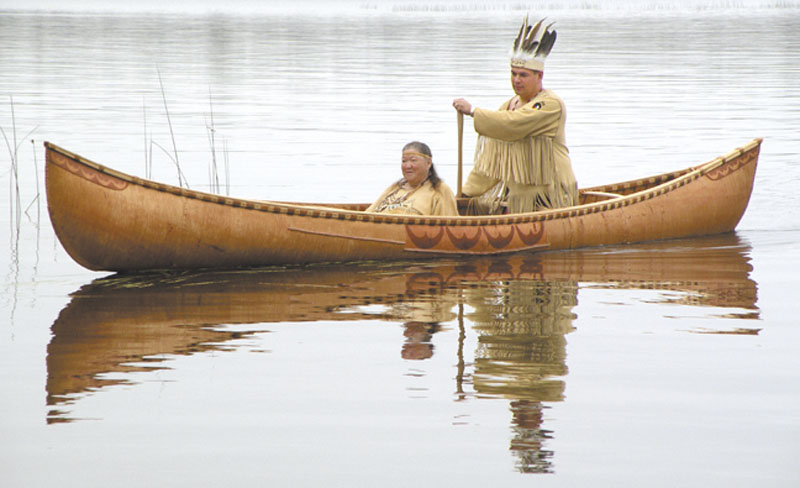INDIAN TOWNSHIP (AP) — Long before Europeans arrived, the Passamaquoddy tribe spent summers feasting on seafood along the rocky shore of Passamaquoddy Bay, known for its dramatic tidal changes. In the winter, the tribe traveled up the St. Croix River in birch canoes to hunt deer, caribou and moose in vast tracts of woods.
Back then, the land and sea gave the tribe everything it needed.
In modern times, the tribe faces strained budgets and staggering unemployment and is again looking to wind, water and land to provide for the tribe through initiatives that could one day include a commercial wind farm, a bottled water plant and maple syrup production.
Across the United States, 220 tribes operate about 400 casinos, but economic development expands beyond that into real estate, construction and energy.
Two tribes in Wisconsin and two in southern California formed Four Fires LLC to collaborate on construction of a hotel in Washington, D.C. In Florida, the Seminoles own the Hard Rock brand. The Southern Ute in southwestern Colorado and Osage Nation in Oklahoma have successful oil and gas operations.
“Tribes, large and small, have found success in gaming, in construction, in defense contracting,” said Carl Artman, who runs the Tribal Economic Development Program at the Arizona State University College of Law. “It’s all over the board. They vary in size. They vary in geography. It’s a matter of tribal leaders taking advantage of the opportunities that are before them.”
At the nation’s northeastern tip, the Passamaquoddies wanted to build a racetrack casino to give a boost to the sagging economy for 35,000 residents in Washington County. The rejection last week by Maine voters doesn’t dampen enthusiasm for the tribe’s other economic development efforts.
“You lose when you give up. You lose when you surrender. I’m not about to do that,” said Clayton Cleaves, tribal chief from Pleasant Point, where 780 tribal members reside. Another 600 tribal members live 45 miles away on a series of lakes in Indian Township reservation.
The latest census figures from the Bureau of Indian Affairs put unemployment at greater than 60 percent on both reservations in 2005, and that was before the banking meltdown that left the U.S. economy hobbled.
The tribe’s housing comes from federal dollars, and it also receives assistance from the state. The goal is for the tribe to become sufficient and free itself from state and federal aid, tribal leaders say.
Decent-paying jobs will go a long way to addressing many of the county’s problems that include widespread prescription drug abuse, as well as helping the tribal budget, tribal leaders say.
Already, tribal members have a successful joint venture in a blueberry operation. And Indian Township owns a company, Creative Apparel, which provides jobs for more than 300 people producing chemical warfare suits for the military.
Looking ahead, the tribe plans to launch a syrup-making operation on 37,000 acres of land on which several hundred thousand maple trees grow near Jackman.
The Passamaquoddies are early in the process of exploring the possibility of tapping into a natural spring at Indian Township. The aquifer produces 200 gallons a minute of water, and the tribe is considering building a bottling plant.
The tribe is also looking to tap into green energy, initiating a feasibility study for a 54-megawatt wind farm on a ridge in Township 19 near Columbia Falls. The tribe has enlisted the state’s former economic and community development chief to help determine the suitability of the site.
“It’s an exciting project because it would be a tribally owned project that would help transform the tribe, but obviously we have a lot of work to do,” said John Richardson, who’s the managing director of Native Power LLC, the company set up to explore green energy.
The tribe’s economic development plan still includes a racetrack casino, something the tribe has sought since 1992, long before state voters approved to two other gambling facilities, Hollywood Slots in Bangor and a casino that’s under construction in Oxford.
Passamaquoddies, along with the Penobscot Indian Nation, were defeated in 2003 when they proposed a casino in Sanford. In 2007, Passamaquoddies tried again for a racino, and voters rejected them again. In the Legislature, racino proposals have received approval, only to be vetoed by then-Gov. John Baldacci.
On Tuesday, voters handed the tribe another defeat.
Indian Township Chief Joseph Socobasin said the latest casino setback was disappointing, but he said the outcome didn’t sting nearly as much as in 2003 when voters rejected a tribal casino. Back then, he said, there was no backup plan for creating jobs.
The tribe still wants to build a casino that could lure people from across the border from Canada and provide jobs for the Down East region, and it will be back in Augusta in January to begin lobbying anew for a casino, Socobasin said. But the tribe has known all along that it needs economic diversity and cannot tie its future to any single proposal.
“Gaming isn’t the pie in the sky that’s going to bring all of this revenue to the tribes,” Socobasin said. “We realize it isn’t going to solve all of our problems. We need three or four things.”
Send questions/comments to the editors.



Success. Please wait for the page to reload. If the page does not reload within 5 seconds, please refresh the page.
Enter your email and password to access comments.
Hi, to comment on stories you must . This profile is in addition to your subscription and website login.
Already have a commenting profile? .
Invalid username/password.
Please check your email to confirm and complete your registration.
Only subscribers are eligible to post comments. Please subscribe or login first for digital access. Here’s why.
Use the form below to reset your password. When you've submitted your account email, we will send an email with a reset code.